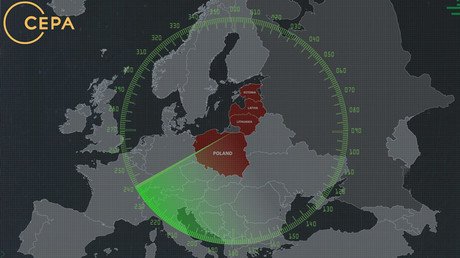How US Senate is being fed misinformation by Russia policy advisors

Watching a recent US Senate hearing on Russia is eye-opening. It proves just how poorly American politicians are being briefed on the country and it helps explain a lot of the trouble Washington has in dealing with Moscow.
Let’s face it, US Senate hearings won’t be prime-time entertainment any time soon. They are, with few exceptions, long-winded affairs, heavy on jargon. However, occasionally one comes along that promises to be a bit more of a draw.
We got lucky with one blockbuster event last week, when the Committee on Foreign Relations held a panel to decide how to ‘handle’ Russia. What made this gathering stand out were the participants. The presence of Michael Carpenter, representing the Pentagon, would have been noteworthy in itself. But the fact that he was paired with Victoria Nuland, of the Maidan cookies’ and "f**k the EU" fame, practically had us reaching for the popcorn.
Right now, Nuland owns possibly the most influential voice when it comes to forming Washington's policy towards Moscow. The fact that her husband, Robert Kagan, has emerged as a pivotal supporter of Hillary Clinton’s presidential campaign has even fed speculation that she might be in the running to become the next Secretary of State. While that’s possibly a stretch, there is no doubt that in a possible future Clinton Presidency, Nuland is likely to play a major role.
Given her job-remit, you’d expect her to have an impressive handle on the facts surrounding Russia. Indeed, you’d imagine they’d be watertight, proving that Nuland was worthy of the exalted title of ‘Assistant Secretary at the Bureau of European and Eurasian Affairs of the US Department of State’. Furthermore, it’d also be reasonable to expect that Carpenter, as ‘Deputy Assistant Secretary Of Defense with responsibility for Russia, Ukraine, And Eurasia’ would have a genuine expert's grasp of the region.
Instead, both Carpenter and Nuland’s testimonies were littered with basic errors. This raises serious questions about the quality of advice on Russia and the rest of Eastern Europe and Eurasia that the US government is receiving, and the resulting effect on policy choices.
Expert Disinformation
The sheer number of errors means that only a snapshot of the disinformation presented by the duo is possible – a prospect more frightening than entertaining.
Right from the start, the committee Chairman, Senator Bob Corker, insisted that Russia “joined the civil war in Syria.” In reality, Syria’s legitimate government (the one with a seat at the United Nations and other international bodies), requested Russia’s assistance in its battle against terrorists. By contrast, America’s ongoing intervention in Syria is illegal under international law. Neither Nuland nor Carpenter attempted to correct this.
Next up, Senator Ben Cardin opened with reference to “Russia’s actions in Georgia in 2008.” Michael Carpenter echoed the negative view of Moscow’s role as the aggressor in the conflict. In actual fact, even the EU agreed that Georgia’s pro-American President, Mikhail Saakashvili, was the aggressor who started that conflict, when he attacked South Ossetia. Once again, the supposed “experts” made no effort to correct the record.
Then things got rather bizarre. Cardin thanked Vladimir Kara-Murza (who spoke later) for “all that you do for the people of the Russian Federation.” It’s unclear what mandate Cardin thinks Kara-Murza has inside Russia? He has never been elected to political office and currently works as a lobbyist for Michael Khodorkovsky, who was convicted of tax evasion in his homeland and is currently wanted for questioning on new charges. We must wonder, did Cardin actually mean “thank you for all you do for American interests in Russia?”
Occupying Minds
Next up was Senator David Perdue, who, like Cardin, insisted that Georgia is under increasing pressure and danger from Russia. That seems unlikely as relations between the two countries have been improving. Or did Perdue confuse declining American dominance of Georgian politics with "Kremlin aggression?" Then of course a stable relationship between Russia and Georgia might become an issue (though not for Georgia, obviously).
Rather than telling Perdue that Moscow and Tbilisi are getting on better these days, ‘expert’ Carpenter replied that Russia “currently occupies about 20 percent of Georgia.” There was no mention of the previous Georgian government's military assaults on South Ossetia and Abkhazia, which are the reasons for the Russian presence. He again insisted on mentioning the “Russian invasion of 2008” – which is not at all how the independent EU report on the conflict described it.
Senator Jeanne Shaheen’s turn was next, with a question about “Russian misinformation.” Nuland decided to reply with a bit of falsity of her own.
"The total appropriation of US State Department, USAID, and Broadcast Board of Governors (BBG) on the US side is about $100 million to counter ‘Russian propaganda’,” she claimed. Nuland then suggested that this, relatively small, amount is spread across a wide range of activities and is so meager the State Department is forced to throw another $88 million of USAID cash into the pot to keep the show on the road in terms of “training Russian journalists” and trying to influence things inside the country.
Nuland then claimed that Russia spends “at least” $400 million on similar projects.
This is incredible obfuscation. RT’s 2016 budget is 17 billion rubles ($260 million at current exchange rates). Meanwhile, the BBG requested $751.5 million for their services this year. Nuland is trying to hoodwink Senators into believing that Russia is spending four times more on the US on media services, when in truth, it’s America which splashes out almost three times the Russian allocation.
Influencing People
In response to Shaheeh’s next query, Nuland reveals that America is conducting secret training camps in the EU to influence Russian journalists. She continues by admitting the US is funding and controlling Russian-language outlets based in the Baltics. She also admits the US has “programs both INSIDE and outside Russia” to help activists “who want to work with us.”
Imagine if Russia had programs inside the US, or say Germany, to do the same thing? It would be called hybrid war. Or “weaponizing information.” Or similar.
Nuland also says we have “a large number of Russian journalists who are working with us and others in Europe, to try to ensure there is ‘independent’ news going back into Russia.” It seems that she’s indicating here that the US government might be supporting Meduza, a controversial Riga-based news service that refuses to reveal its funding.
Later, during a question about NATO funding and its continued relevance, Nuland essentially equates Russia to ISIS as a threat to the US-dominated organization. When it’s so easy to lie about media funding and wars, it’s also a breeze to deliver deception that creates an equivalence between a modern nation state and a barbaric terrorist organization.
Incidentally, this week, Russia is fighting ISIS in Syria, as it has been doing for some time, while the US is busy conducting military exercises in Eastern Europe, near Russia’s border. However, when you deal in unreality like Nuland and Carpenter, you don’t need to think about such things, much less explain them. It'd be better for everyone if Washington could find some actual ‘Russian experts’ who are fit for purpose and know their stuff – and will tell the truth to elected representatives.
The statements, views and opinions expressed in this column are solely those of the author and do not necessarily represent those of RT.















